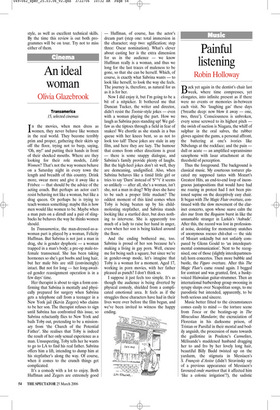An ideal woman
Olivia Glazebrook
Transamerica 15, selected cinemas In the movies, when men dress as women, they never behave like women in the real world. They become terribly prim and proper, gathering their skirts up off the floor, trying not to burp, saying, ‘Oh, my!’ and putting their hands in front of their shocked mouths. Where are they looking for their role models, Little Women? That’s not the way women behave on a Saturday night in every town the length and breadth of this country. Drink more, swear more and give it away like a Frisbee — that should be the advice of the acting coach. But perhaps an actor can’t resist behaving not like a woman, but like a drag queen. Or perhaps he is trying to teach women something: maybe this is how men would like women to be. Maybe when a man puts on a dirndl and a pair of slingbacks he behaves the way he thinks women should.
In Transamerica, the man-dressed-as-awoman part is played by a woman, Felicity Huffman. But Sabrina is not just a man in drag, she is gender dysphoric — a woman trapped in a man’s body; a pre-op male-tofemale transsexual. She has been taking hormones so she’s got boobs and long hair, but her male bits are still (convincingly) intact. But not for long — her long-awaited gender reassignment operation is in a few days’ time.
Her therapist is about to sign a form confirming that Sabrina is mentally and physically prepared for surgery when Sabrina gets a telephone call from a teenager in a New York jail (Kevin Zegers) who claims to be her son. The therapist refuses to sign until Sabrina has confronted this issue, so Sabrina reluctantly flies to New York and bails Toby out, pretending to be a missionary from ‘the Church of the Potential Father’. She realises that Toby is indeed the result of her only sexual experience as a man. Unsuspecting, Toby tells her he wants to go to LA to find his real father. Sabrina offers him a lift, intending to dump him at his stepfather’s along the way. Of course, when it comes to the crunch things get complicated.
It’s a comedy with a lot to enjoy. Both Huffman and Zegers are extremely good — Huffman, of course, has the actor’s dream part (step one: total immersion in the character; step two: uglification; step three: Oscar nomination). What’s clever about casting her is the extra dimension for us in the audience — we know Huffman really is a woman, and thus we long for the last traces of maleness to be gone, so that she can be herself. Which, of course, is exactly what Sabrina wants — to look like herself, to look the way she feels. The journey is, therefore, as natural for us as it is for her.
Now I did enjoy it, but I’m going to be a bit of a nitpicker. It bothered me that Duncan Tucker, the writer and director, didn’t resist the Tootsie-style jokes — even with a woman playing the part. How we laugh as Sabrina pees standing up! We guffaw as she tiptoes through a field in fear of snakes! We chortle as she stands in a bus queue with her knees bent, so as not to look too tall! These jokes are stale in any film, and here they are lazy. The humour that comes from other directions is great — there is some snappy dialogue, and Sabrina’s family provide plenty of laughs. But the high-heel jokes don’t sit well, they are demeaning, undignified. Also, when Sabrina behaves like a timid little girl or tries to say ‘Darn’ instead of ‘S**t’ it seems so unlikely — after all, she’s a woman, isn’t she, not a man in drag? Why does she have to be such a proper little madam? The oddest moment of this kind comes when Toby is being beaten up by his childmolesting stepfather, and Sabrina stands looking like a startled deer, but does nothing to intervene. She is apparently too much of a lady to raise her hand in anger, even when her son is being kicked around the floor.
And the ending bothered me, too. Sabrina is proud of her son because he’s making a living in gay porn. Well, excuse me for being such a square, but since we’re in gender-swap mode, let’s imagine that Toby is a woman for a moment. Aged 17, working in porn movies, with her father pleased as punch? I don’t think so.
I suppose it just feels too simple. It’s as though the audience is being diverted by physical comedy, shielded from a complicated emotional area. It feels as if the struggles these characters have had in their lives were over before the film began, and we’ve been invited to witness the happy ending.























































 Previous page
Previous page